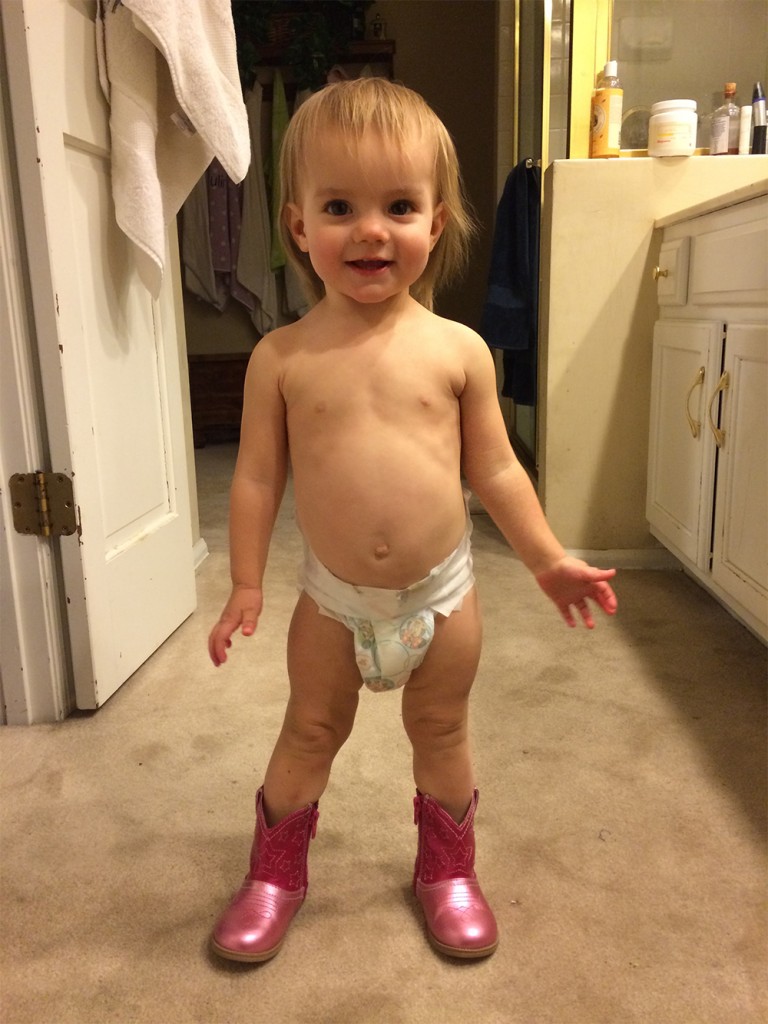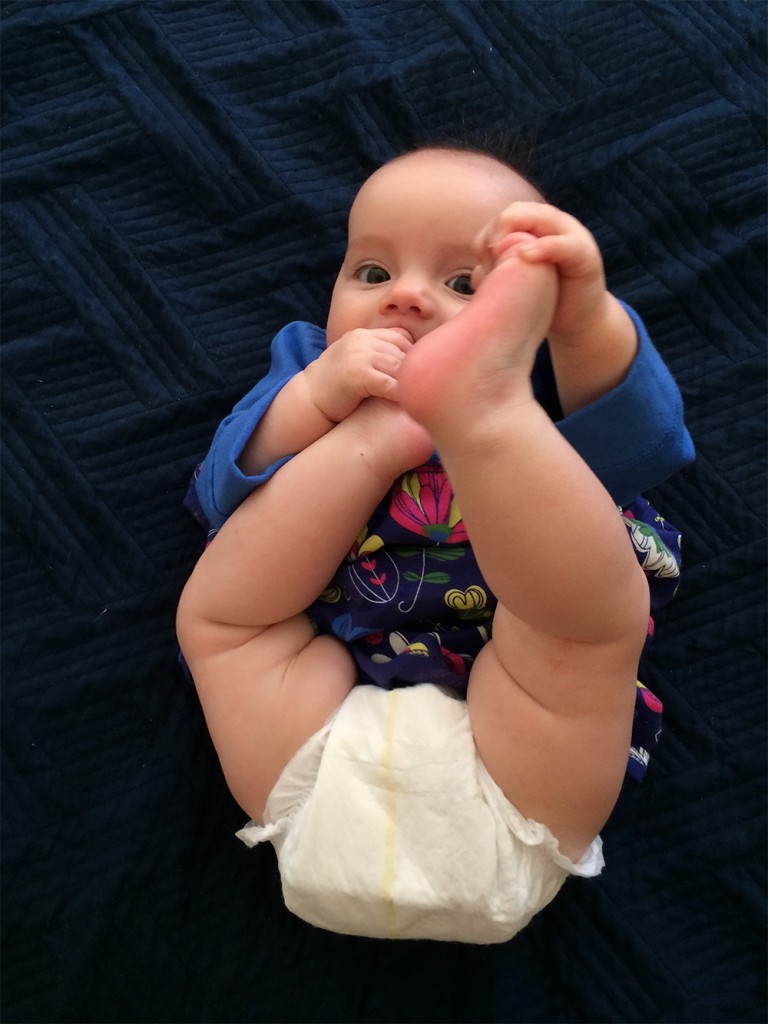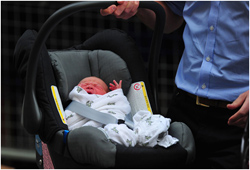 “Is 18 days too long to go without pooping?” a mom of a 3-month-old asked. Believe it or not, yes, sometimes this is okay. How long is too long for an infant to go without pooping? The answer depends on age and diet, but most of the time babies that won’t poop are fine with little or no treatment. Here’s why babies can go a long time between bowel movements, and when you need to be concerned about constipation and other rare medical emergencies:
“Is 18 days too long to go without pooping?” a mom of a 3-month-old asked. Believe it or not, yes, sometimes this is okay. How long is too long for an infant to go without pooping? The answer depends on age and diet, but most of the time babies that won’t poop are fine with little or no treatment. Here’s why babies can go a long time between bowel movements, and when you need to be concerned about constipation and other rare medical emergencies:
Constipation is Rare in Breastfed Babies
Infants older than eight weeks often go 4 or 5 days without a dirty diaper, and it doesn’t mean they are constipated. Breastfed babies, especially if they have not started solid foods, can easily go two weeks without a poopy diaper once they are 2-3 months old. Breastmilk is exactly what your baby needs, and so there is little waste product left for the baby to poop out. Exclusively breastfed babies are almost never constipated. They may go a long time without pooping, but their belly is not full of poop. If your baby seems uncomfortable, there is probably something else wrong. Breastmilk is a natural laxative and exclusively breastfed babies who have not started solid foods almost never need a laxative.
Constipation is Common When Switching to Solid Foods
Formula-fed babies and babies who have started solid foods often become constipated, but it is easily treated. If your baby seems uncomfortable, is straining to have a bowel movement, or is having hard, solid stools, they are probably constipated. Try massaging your baby’s belly, giving him or her a warm bath, or taking a rectal temperature. Taking a rectal temperature stimulates the rectum and also checks for a fever, which could indicate a more serious reason why your baby is uncomfortable. If your baby is still constipated and does not have a fever, try one ounce of prune or pear juice and/or an infant glycerin rectal suppository. Infant suppositories are available over-the-counter at any pharmacy or by prescription from your pediatrician.
Newborn Babies Poop Frequently
Newborn babies often poop after every feeding, about 6 times per day. In the first few weeks after delivery, your baby’s intestines are maturing and becoming more efficient at extracting nutrition from breast milk or formula. As their intestines get better at digesting food, the time between bowel movements gets longer and longer. Before you know it, you have a two-month-old that is going several days without dirtying their diaper.
Why Do Babies Get Constipated?
 Infants are still developing strength in their abdominal muscles, and hence they may have to work a bit to poop. Any mom who has just had a baby understands this. When you are full-term and don’t have much abdominal muscle strength, it is very hard to poop. New babies are in the same predicament, without much abdominal muscle, they have to strain to poop, even if their poop is soft. It can be normal for babies to push or strain just a little to pass a stool. This is their exercise, they are building their abdominal muscles.
Infants are still developing strength in their abdominal muscles, and hence they may have to work a bit to poop. Any mom who has just had a baby understands this. When you are full-term and don’t have much abdominal muscle strength, it is very hard to poop. New babies are in the same predicament, without much abdominal muscle, they have to strain to poop, even if their poop is soft. It can be normal for babies to push or strain just a little to pass a stool. This is their exercise, they are building their abdominal muscles.
Formula-fed babies can have firm stools and may need some prune or pear juice as a laxative. Adult laxatives like milk of magnesia can be dangerous for infants. Never give an infant any other laxative unless recommended by a physician.
Babies Often Get Constipated When They Switch To Cow’s Milk
Once a Baby Starts Cow’s Milk At 12 Months of Age, they often get constipated. Cow’s milk is very constipating but is important for calcium and vitamin D in your baby’s diet. Are you considering another kind of milk for your baby or toddler, such as organic, raw, almond, soy, rice, or omega-3 fortified? Each of these has certain risks and benefits, so be sure to read up on milk before you make a switch.
As your one-year-old transitions off breastmilk or formula, be sure to include plenty of fruits and veggies in their diet as a natural laxative. Prepare toddler foods are convenient for traveling and time crunches, but research shows they contain high levels of salt and sugar. Dr. Sisk writes about how to be a savvy shopper for toddler food.
When Should You Seek Medical Care For Your Child?
If your baby has blood in his or her stool, persistent crying, fever, or isn’t feeding normally, you need to seek medical care. Yellow or green spit-up or vomit is a medical emergency in infants as this can be a sign of a bowel obstruction. Bloody stools in infants can be due to formula intolerance or can be the result of a tiny rectal tear from passing a large, hard stool. There are rare but serious reasons why babies go a long time between bowel movements, have abdominal pain, have yellow-green (bilious) spit-up, or have blood in their stool. These uncommon conditions include intussusception, malrotation and volvulus, and necrotizing enterocolitis. Some rare genetic disorders such as cystic fibrosis and Hirschsprung disease can first present as an infant that goes a long time without stooling, but usually, these infants don’t have a period of frequent stooling in the first days and weeks after birth. Now that we have prenatal testing for cystic fibrosis, most parents know of this diagnosis before their baby is born.
Consult With Your Pediatrician Before Giving Your Baby Water
Do not give your baby water. Although dehydration can be a cause of constipation, do not give your infant water unless instructed to do so by a physician. Giving water to infants can result in electrolyte disturbances that can be serious and sometimes fatal. Breast milk and formula contain just the right amount of sodium, chloride, potassium, and other electrolytes. When you give water you can dilute these electrolytes. Although your baby’s kidneys should correct for electrolyte changes, too much water can be more than their kidneys can correct.
18 Days Without Pooping Wasn’t A Reason For Concern
As for the 3-month-old who went 18 days without a poop, he was fine! Because he was exclusively breastfed, happy, feeding well, and previously pooped regularly, I wasn’t concerned. He got a glycerin rectal suppository and pooped almost immediately, filling his diaper with that distinctive breastmilk poop that only a mother (and a pediatrician) could love.
If you have a toddler or older child that struggles with constipation, our St. Louis Children’s Hospital Pediatric Gastroenterology specialists have prepared a brochure full of tips for handling constipation. You can schedule an appointment with a specialist from Gastroenterology and Nutrition by calling 314.454.KIDS (5437) or 800.678.KIDS (5437).






My newly infant baby doesn’t poop yet since he was born …what shall I do??he is 5 days old now…
Marilet,
Have you talked to dr? Did they mention hirschsprungs disease? My 3 month old may end up getting checked for this so i’m curious what they said to you?
This article is really helpful, however I noticed it’s mainly about 2 to 3 month olds. My three week old son hasn’t pooped in almost a week. Is it normal? He’s 98% breastfed, and only occasionally formula fed. Initially, he was pooping a few times a day, but all of a sudden we’ve gone almost a week with no poop. The doctor suggested I drink prune juice since I’m breastfeeding, but still nothing. Is it normal?
My exclusively breastfed son went 23 days without a poop around 5-6 months. He always has long stretches but this was the longest and he was fine (and his doctor wasn’t concerned and just said he was a “good absorber”).
My daughter is a week old and hasn’t pooped all day. Should I be worried?
My 6 months granddaughter has not popped in 2 days. What is good for her to take.
my 4 months old gal used to poop everyday but now she has gone for 5days without pooing is it normal.she is just urinating
My baby is 32 days old and has taken now 2 days without poop tho he is urinating well. Should I stop being anxious? He has been fine though today he has shown signs of discomfort and has cried a bit.
My baby is exclusively breast fed since last 3 months, last 3 days he has not pooped and since today morning is not breast feeding, infact he vomitted twice. What could be the reason and what remedy/ action is suggested
All of these comments show these parents never even read the article!
Any answers
Juice before one is NOT good advice.
Good morning, my baby is four weeks, his having a difficult in pooping, always struggling to poop but nothing is coming out but gas.
I was told that bananas and the dry rice cereals can constipate. That if your baby is constipated to do the dry oat cereal and cut bananas out too and look for baby foods that have the most fiber in them. Apricot, pear, prune…those are a few, but there are plenty more. I also bought some chia seeds and mixed a little in my child’s food. They have TONS of fiber. I was also told to do pear juice. It was really the best juice I found for constipation in my daughter along with high fiber foods, no bananas And no rice cereal. Now she just eats whatever and is fine.
Sticky, mucusy poop could mean infection, food allergy, or something else. I would take pictures and a stool sample to your doctor.
He probably just has gas, honestly. Often babies have issues with milk, soy, egg, other allergens like gluten or nuts, spicy food, beans, broccoli, and others in your diet if you breastfeed or soy and milk in formula. This can cause gas and tummy pain. Best to consult doctor.
My wife’s first child after several visits to a MD saying was constipation after several months of insisting that it wasn’t constipation. Eventually the child saw a specialist and after a few test was diadnosed with Hirschsprung’s disease is a birth defect that affects the nerve cells in the large intestine. These nerve cells control the muscles that normally push food and waste through the large intestine.
In babies who have Hirschsprung’s disease, the muscles in the wall of the large intestine don’t relax , which prevents stool from passing. This can lead to trapped stool, infection, pain and swelling, and bowel problems.
Most of the time, the disease is found soon after birth. It occurs in about 1 out of every 5,000 newborns and is most common in male babies.1